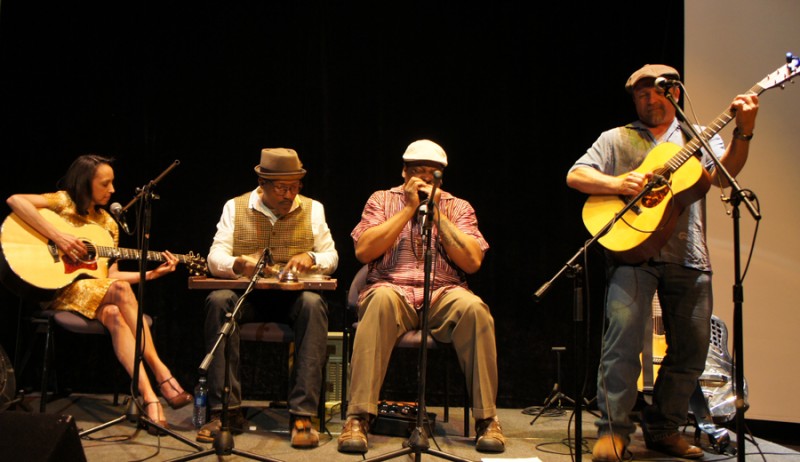May 3, 2013 – ArtsWestchester, White Plains, New York – Peckham Gallery
An Evening of Piedmont Blues – Hosted by Frank Matheis, publisher of thecountryblues.com
featuring Phil Wiggins, Toby Walker and Piedmont Bluz (Valerie and Ben Turner)
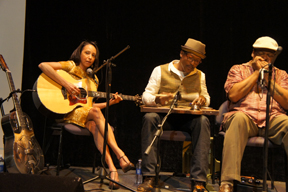
The fabulous building that once housed a bank had been converted to an art gallery and performance space. In a peculiar juxtaposition to the past use of the building, the musicians practiced backstage in a giant 19th Century bank vault with a huge iron door 7 feet tall and 3 feet wide. The space is normally an art gallery but the recent exhibit had just come down. This was the last show of the Spring Season at ArtsWestchester, one of the most important cultural institutions in the Hudson Valley. The 100 person capacity room was filled with people, old and young, ranging from hardcore blues fans to people new to the genre.
The evening was billed as “Piedmont Blues night” – the acoustic blues in the tradition of the East Coast. The Piedmont blues is a gentle and melodic blues style native to the mid-Atlantic region of the US, particularly to the Carolinas and Virginia over to Tennessee, but practiced along the entire mid-Atlantic region of the US. The rich folk tradition in the Piedmont country blues owes much to ragtime, traditional Appalachian Mountain music and the early country music of the 1930s. This blues style is characterized in part by intricate fingerpicking with alternating bass and a simultaneous syncopated melody picked on the treble strings. It was simply regional folk music played by both white and black musicians and it remained such to this day. Sonny Terry & Brownie McGhee, Doc Boggs, Doc Watson, Nat Turner, John Jackson, John Cephas & Phil Wiggins, Warner Williams and Jay Summerour, Elizabeth Cotten, Blind Connie Williams, Etta Baker, Jerry Ricks, Archie Edwards and Bill Harris were among the many who continued that noble tradition made famous by Blind Blake, Gary Davis, Blind Boy Fuller, Blind Willie McTell and many others along the in the East Coast. Piedmont blues differs greatly from the other country blues styles, such as Texas, Georgia or Mississippi Delta Blues.
Dr. Tom Van Buren, folklorist at ArtsWestchester and organizer of the Spring Concert Series, opened the evening and turned over the MC mic to thecountryblues.com publisher Frank Matheis, who hosted the evening.
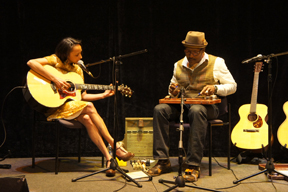
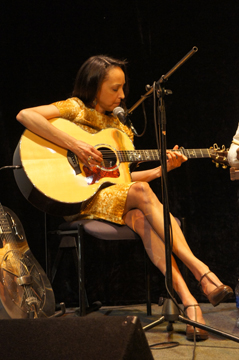
The show opened with the wonderful duo of Valerie Turner on guitar and vocals and Ben Turner on washboard, percussion and harmonica. Valerie was a student of the late guitarist and songster “Bowling Green” John Cephas, the former duo partner of Phil Wiggins. John Cephas asked Valerie to carry on the music, and Valerie has worked tirelessly over many years to perfect her finger style guitar virtuosity. When joined by her husband, Ben Turner, his subtle touches add just the right amount of texture. Hailing from Trinidad, Ben keeps the beat by blending washboard techniques learned from Newman Taylor Baker and Washboard Chaz into his own unique style. Occasionally, he also chimes in on harp for added accents.
Valerie Turner’s gentle style, reminiscent of Etta Baker and Elizabeth Cotten, her reserved, light approach to the music and her exceptional fingerpicking guitar work instantly won over the audience. The elegant and articulate artist’s musical style as singer/guitarist is best described as graceful and beautiful, with evident love for the music and a keen understanding of her role as one of the few women carrying on this tradition. Ben Turner was an audience favorite with his homemade washboards, which he proudly showed to the audience, who loved his descriptions and explanations.
The duo set the stage for a great night of music and received loads of accolades for days after the show. They returned for two encores, joined by their longtime friend Phil Wiggins on harmonica.
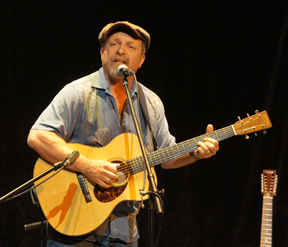
Toby Walker then took the stage and instantly proved why he is considered to be one of the best acoustic blues guitar virtuosos. Toby plays with the grit and truehearted feeling of a man whose heart and soul lives and knows the blues. Few musicians in the acoustic blues genre have worked harder at mastering and synthesizing a wide range of styles. For two decades he took every opportunity to travel down south to apprentice with the old-school bluesmen, learning finger picking and slide methods, syncopations, rhythms and tunings directly from the last generation of Golden-Era blues musicians. He learned firsthand from old masters like R.L. Burnside, Eugene Powell (aka. Sonny Boy Nelson); James “Son” Thomas; Jack Owens of Betonia; Bud Spires; Etta Baker; Turner Fuddrell and many more. He was welcomed into the homes and backyards of these blues men because he is a genuinely sincere and affable fellow who is the “real deal” – a hardworking and talented devotee of the blues who had the chops to back it up. He is also a consummate entertainer who established a connection and rapport with his audience seconds after taking the stage. Superlative as a slide guitarist and finger-picker, equal parts instrumentalist, singer and storyteller, Toby put forth a passionate set on 6 and 12-string guitars. He impressed with his sheer guitar prowess, showcasing a range of fiery tunes. The audience was enthralled, particularly with his 12 string rendition of Statesboro Blues by Blind Willie McTell. After he performed his solo show he was joined for two songs by harmonica ace Phil Wiggins. The two musicians had never met until the day before the show when they first rehearsed the sets. They played like kindred spirits, musical duo partners who had been destined to meet.
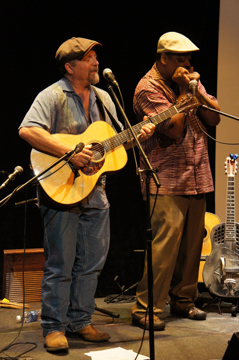
By the time the main act, harmonica player Phil Wiggins took the stage, two hours had already passed, but the best was yet to come.
Internationally renowned harmonica ace Phil Wiggins has mastered a wide range of harmonica styles in the traditional, country blues style and today is considered as one of the best performers of the instrument in the world. From 1976 to 2009, Phil Wiggins was the duo partner to “Bowling Green” John Cephas. The duo carried on the guitar-harmonica sound of Brownie McGhee and Sonny Terry before them. Cephas & Wiggins were the premier blues duo over the 33 years since they first connected at the Smithsonian Folklife festival in 1976. They embodied a superlative, fun and delightful blues style, the essence of true-hearted down-home blues. Cephas & Wiggins were Alligator records artists and W.C. Handy award winners. They were fixtures on the festival and workshop circuit as minstrels, teachers, folklorists, storytellers and proponents of the rich African-American folk tradition. Since the passing of John Cephas, Phil Wiggins has played with many other partners, including Nat Reese, Rick Franklin, Eleanor Ellis, Corey Harris, Guy Davis and many more. Phil Wiggins actively teaches and travels the world as performer, most recently to Russia. Soon after the show he went on to Belgium and Denmark.
Phil Wiggins performed three songs singing his originals and accompanying himself on solo harmonica. The listening room fell into silence as people were captivated by Phil Wiggins’ soulful singing, and deep roots blues performance. He was then joined by Toby Walker, who backed up the harmonica virtuoso on the remainder of the set.
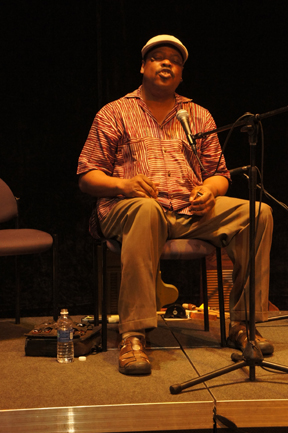
The audience was delighted and amazed at how absolutely phenomenally Phil Wiggins played with exquisite phrasing, beautiful melodicism and mind-boggling solos. The scope and range of his rhythms and tilting harmonics were simply breathtaking. Numerous blues aficionados in the audience later reported that this performance was the best harmonica playing they had ever heard, and few who witnessed the occasion would disagree,
The four musicians joined on stage two numbers to close out the three hour show, to rousing applause and adoration. It was a successful night for the acoustic blues in downtown White Plains, and for many in the audience, their first exposure to this great genre of American folklore music.